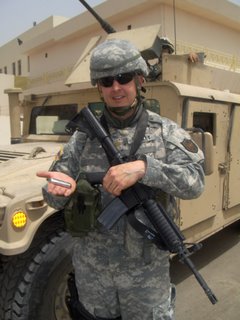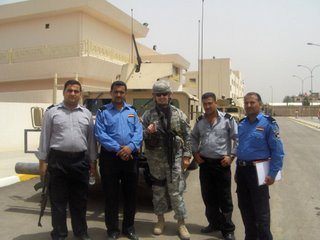MAJ Fridley and the Class of 08
One of them is my BR, MAJ Mitch Fridley VMI '89. Here's an article he wrote some weeks ago that I wanted to save until he was home safe and sound. In the photo below you can see him during the convoy he described. In his hand is a little ingot of metal he took with him, and that he sent back to the cadets of the class of 2008, who had it melted down so that a little of it could go in their rings, which they will receive this fall.
The best missions are those that go off without any contact. There aren’t many incidences of glorious combat in Iraq. There’s not much closing with and vanquishing the enemy on the field of battle. There’s nothing romantic about remotely improvised explosive devices exploding underneath a HMMWV, or sporadic gunfire from a neighborhood that usually doesn’t hit anything and when it does it doesn’t penetrate our up-armored vehicles. So on my recent mission into Baghdad to assist the Iraqi Police Services with several construction projects, I was more than happy to be able to report that we didn’t have any contact, and we did have a very successful day in support of our command’s mission, and therefore, really, of America’s mission in this hellish sandy country in the middle of the Middle East.
The mission of the Multi-national Security Transition Command – Iraq is to rebuild, organize, equip, train, and mentor the Iraqi Security Forces. This means not only the forces themselves but the infrastructure for that force, to include the police. Right now across Iraq, my command is overseeing the construction (or reconstruction) of 190 police stations and over 70 military facilities. As you can imagine, this requires “hands-on” quality control, and we have a J-7 office of engineers that travel out to these sites and check on their progress (or lack thereof). Any time we travel outside of the secure International Zone, there is significant requirement for security, and we travel in armored HMMWVs sporting .50 cal machine guns, and when we dismount at a site, the majority of the people are scanning sectors and rooftops while the “primaries” conduct whatever surveys or business they need to conduct. With the myriad of missions we need to make, we are always looking for people to go along and provide security for the primaries. As a member of the J3 Operations section, I could provide some command and control, give my boss some situational awareness of an operation “outside the wire”, and provide some of the aforementioned security.

So, on the morning of 09 May, I found myself “back seating” in a J7 convoy to check on four different construction sites in the Red Zone. On one hand it was a routine mission, but on another hand, no mission over here is routine, and these four construction sites for the Iraqi Police are critical to the future security of Baghdad. We rolled at 0730 and headed north up Route Force to the Al Ghazalia Police Station in northern Baghdad. This station was full of cheerful Iraqi policemen (IPs) and a bunch of beat up Toyota trucks, which are the standard mode of transportation for the IP. The station is considered in pretty good shape by Iraqi standards, although someone new to this war zone would be reminded of barnyard from biblical times. It’s been blown up twice and we are trying to get it rebuilt. My biggest concern, as a member of the security detail, was the large warehouse across the street that has been recently and frequently used by snipers to fire into the police station. Thankfully there were no bad guys in it this day.
Some words about the convoy that we traveled in to get out to these sites and around the city; Americans own the roads. Our four HMMWVs in tight single file formation speed through city streets at 50mph, sirens blaring, and gunners up in the turrets waving traffic out of the way. The locals pull off the road. If they don’t pull over, they risk getting shot. One big truck that didn’t move for us had an M16 round fired in the road next to it – they moved over. If we run into a traffic jam, we immediately jump the curb and “swim upstream” into traffic to get around the jam. We executed this maneuver a half a dozen times on this day. Just being in a convoy is a nerve-wracking experience. Everyone is intense, scanning the roads for potential suicide vehicle-borne improvised explosive devices (VBIEDs) and snipers. Even without being attacked, in the 120 degree heat and constant high-level of alert, we are worn out after a day on the road.
Our next stop was the Al Risallah IP station outside Abu Ghraib. Very similar to the first station, and we were pleased to see that the local contractor was making progress and the IPs were satisfied – even though the work is rudimentary and all done by hand. After lunch we cut through the secure area around Baghdad Airport and Camp Victory and the V Corps headquarters and stopped at the Waleed National Police site.
Iraq has National Police in addition to local and city police. This group is more similar to what we would call SWAT, and some of them have armored vehicles. This was a much larger facility and there is an American transition team assigned to train these National Police. We were checking the progress on a multi-million dollar barracks complex. It was clean and air-conditioned, and they were even using power tools and back-hoe. When you put into perspective the amount of money and energy and risk the Americans and the Coalition are putting into building this nation, it is astounding. But, it really all comes down to things like our little group out there in the middle of Baghdad making sure its happening, and the American National Police training team living and working with the Iraqis.
The last stop on our trip was the FPS (Facilities Protective Service) Academy across the river from the U.S. Embassy (soon to be the old American Embassy). This is where FPS officers are trained to provide security and defend Iraqi national infrastructure. These officers will be assigned to the various ministries to protect and defend everything from the oil pipelines, power plants, and national monuments, to ministerial buildings. I found a group of Iraqi Police and FPS officers and gathered them around to take a picture with me and my piece of metal. With my broken Arabic and their broken English, it was pretty much impossible to explain to them what the small piece of metal was and why it was important to take a picture. But, Iraqis love picture taking and they were happy to join in.

After one more harrowing trip around the Ministry of Interior where people get blown up almost weekly, we entered back into the Green Zone and back to the compound. It was long hot day, but essential to building this country. Someday, hopefully, we can all look back on this country and tell our grandkids, “I was there, I helped build that.”

